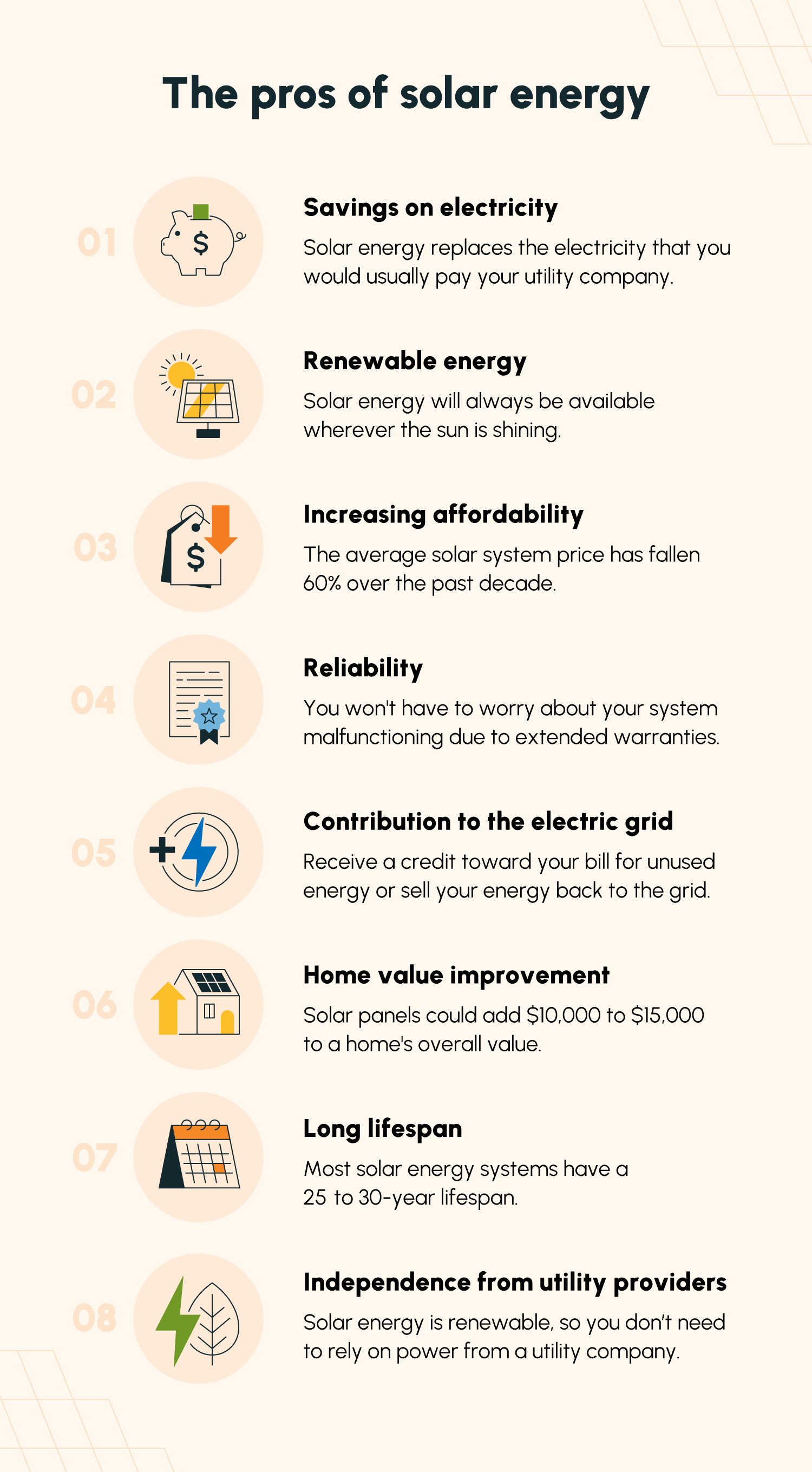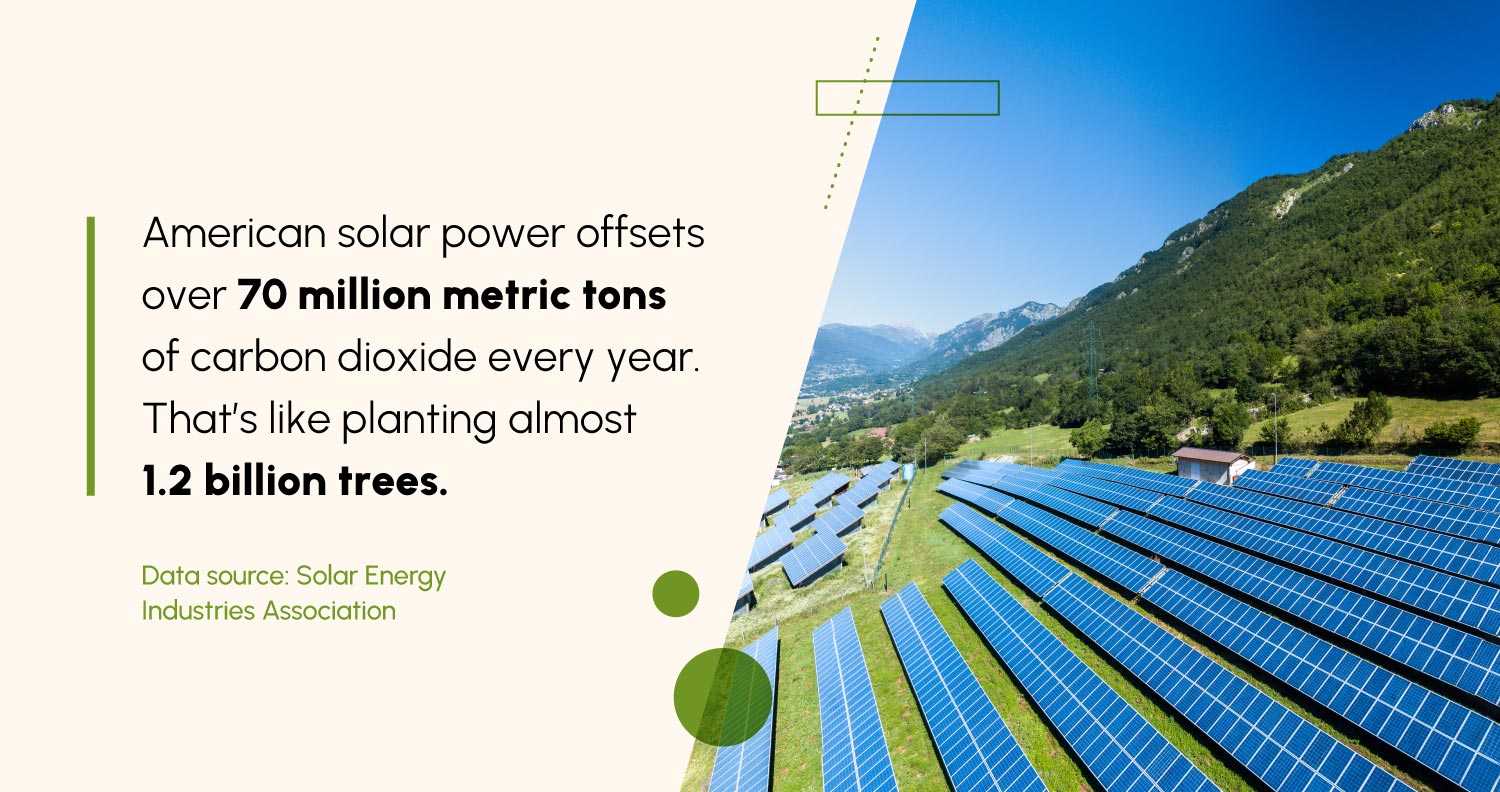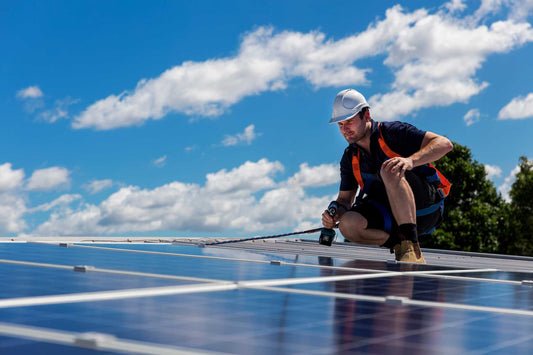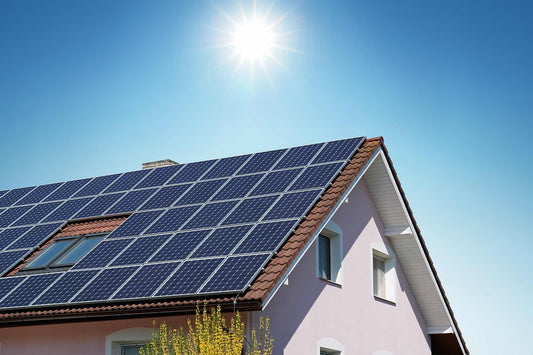The sun does more than just provide light — it could be the powerhouse to provide your home or business with energy. By installing solar panels, you can experience the luxury of independent power.
Despite all the benefits solar panels offer, you might have heard criticisms of this renewable energy option. While some might consider solar energy to be costly or ineffective, it has proven to be reliable and beneficial for the environment and for your lifestyle.
But do the advantages outweigh the negatives? Let’s break down the pros and cons of solar energy so you can fully understand what you’re getting yourself into when deciding whether to install solar panels.
8 Advantages of Solar Energy
When it comes to solar energy, savings, efficiency, and reliability are some of the most notable advantages. Let’s dive into some other benefits of solar panels.

1. Savings on Electricity
The electricity generated from a solar system produces power that you would usually pay your utility company for, leading to a lower electric bill. This is typically the case as long as the long-term cost of solar is lower than the long-term cost of paying your utility company. On average, homeowners who install solar panels will break even between six and 10 years due to utility bill savings.
Solar panels typically run for 25-30 years, which means you could significantly lower your bill for up to three decades. Instead of paying your monthly utility bill, you could pay off your solar power system and receive a return on investment.
Let’s break down some of the numbers to clearly see the potential savings. If the upfront cost of a solar system is $10,000 after rebates with an annual savings of $1,200, you could have overall savings of $30,000. After you deduct the upfront investment, you save $20,000.
Keep in mind that the actual savings will depend on the system size and efficiency of your solar system.
2. Renewable Energy
The great thing about solar energy is it will always be available wherever the sun is shining. Solar energy is available every day all over the world because the sun is powerful enough.
Solar energy is also the most abundant source of energy available. Unlike other sources of energy, this renewable source cannot run out. According to experts, the sun will be here for another 5 billion years!
3. Reliability
Solar panels are equipped to withstand most climates and weather conditions. You can rely on these energy-producing systems to last due to their long warranties. You can expect years of reliable energy from Solartap’s solar panels, reflected in our 25-year warranty.
Most solar energy systems do not require much maintenance. You must keep them clean, but that is basically the extent of routine maintenance. Since there aren’t any moving parts, you do not have to worry about wear and tear.
Keep in mind the inverter and cables will need to be replaced periodically. Inverters, for example, have a lifespan of five to 10 years.
4. Increasing Affordability
Back in the day, it cost a pretty penny to install solar panels in residential areas. Thankfully, the price of solar panels has decreased significantly over the years — the average system price has fallen 60% over the past decade from $40,000 in 2010 to $20,000 today.
There are also incentives like the Federal Investment Tax Credit (ITC) that make solar even more affordable. You could receive a 30% tax credit if your system is installed before the end of 2032.
5. Contribution to the Electric Grid
Often, solar energy isn’t used at the time it’s generated. Unless you have enough solar battery storage to hold all of the energy to use when the sun isn’t shining, surplus energy can be transferred back to the grid via net metering (and your utility company will pay you for that energy).
Solar panels contribute renewable energy to the grid. Net metering is a billing tool that allows you to analyze how much energy you are actually using. This means you could receive a credit toward your bill for the unused energy and basically sell your energy back to the grid.
6. Home Value Improvement
Solar panels do increase home value as long as certain conditions are met, the most important being that the homeowner owns the solar panels rather than renting them via a leasing or PPA agreement.
Based on a Zillow study from 2019, homes with solar energy systems sell for 4.1% more on average. Along these lines, a median-priced home in the U.S. would see its resale value increase by $9,274.
Keep in mind the actual amount of value you can add to your home will vary based on your geographic location.
7. Long Lifespan
The longevity of solar is another advantage of implementing this renewable energy system. Most systems have a lifespan of 25-30 years, meaning you don’t have to worry about your electricity for decades to come. After the 25-year mark, most solar systems can still generate electricity, but at a lower level.
Solar panels are also durable against hail storms and other intense weather conditions. These energy-efficient systems can withstand even the harshest of weather circumstances.
8. Independence From Utility Providers
Since the energy you consume from solar is renewable, you don’t need to rely on power from a utility company.
You can create your own energy and power source without having to depend on anyone else. Say goodbye to calling your local energy provider and hello to independent power.
If you wanted to live off the grid, you could do so with your new independent power source.
5 Disadvantages of Solar Energy
While there are many benefits to solar energy, there are a few cons. Here are a few disadvantages of solar energy.

1. Cost
The initial cost of switching to a solar energy system is certainly a large investment. Larger systems that intake more energy will be more expensive due to the equipment needed.
However, solar loans can cut the upfront cost of solar and make it more attainable. A Residential Property-Assessed Clean Energy (R-PACE) loan is a great option for making long-term, low-cost payments to your solar panels with an end goal of owning the panels. They’re secured loans that attach the cost of your solar panels to your property tax, and usually have a lower APR (between 3% and 8.5%).
Alternatively, you can secure a solar loan through your bank, a credit union, or a government program.
Solar technology is also evolving, so it won’t be a surprise if we see prices reduce even more in the coming years.
2. Time and Climate Limitations
These energy-efficient systems are dependent on sunlight to generate electricity, so cloudy and rainy days can have an effect on your energy supply.
Keep in mind peak sun hours are different depending on where you live and solar energy will not be collected at night. While solar energy collection can be impacted by cloudy or severe weather, you can still collect solar energy via batteries and use this energy when the sun isn’t shining.
3. Hardware Demand
A functional solar system requires a lot of hardware — you will need plenty of panels, wires, inverters, and batteries to operate on solar power. That’s a lot of components to keep track of, and if an issue emerges it can be difficult to troubleshoot.
Also, not all roofs have the space to house all of the hardware needed for a large, high-yield system. It’s also not uncommon for people to find all of the hardware on a roof unattractive.
4. Environmental Concerns
Solar panels are noted for being a more eco-friendly energy option than most, but their production, transportation, and installation still cause pollution and emissions. Also, some solar panels are composed of toxic materials and chemicals.
However, although solar panels are not perfect, they are a huge step in the right direction to reducing emissions and should not be ruled out — they’re the best option for low-emission residential energy production.
5. Roof and Positioning Requirements
Solar panels only operate at maximum efficiency when their direction is ideal. These energy systems work best when facing true south for folks in North America due to the sun’s location. However, not every roof is south-facing, so these homeowners might have to accept a lower yield from their panels.
That being said, even if your panels aren’t operating at max efficiency, they can still offset a very significant part of your energy bill. Batteries are also able to store surplus energy and use it later — it’s unlikely that, even if panels aren’t operating at max efficiency, all of the energy collected between peak hours will be used when collected.
Do the Pros of Solar Outweigh the Cons?
When looking at the pros and cons of solar energy, the advantages outweigh the negatives. Solar panels are currently the best option to cut utility bills drastically and produce renewable energy at home.
Think about all savings you will generate from replacing your electricity source. As long as the sun is shining brightly, you can experience the benefits of solar. With new advancements in technology every year, we will most likely see even more affordable renewable energy options soon.
You can’t forget about the potential home value you could reap the benefits if you implement solar energy. With a long lifespan, you don’t have to worry about replacing your energy source for nearly three decades! Reclaim your independence from utility providers with your new power source.

In the meantime, you can switch over to renewable energy today with the help of Solartap’s low cost, high-yield solar panels. You can receive a residential solar energy system for a fraction of the cost.
Ready to move forward with low-cost solar panel installation? Get a quote with our solar calculator today!




